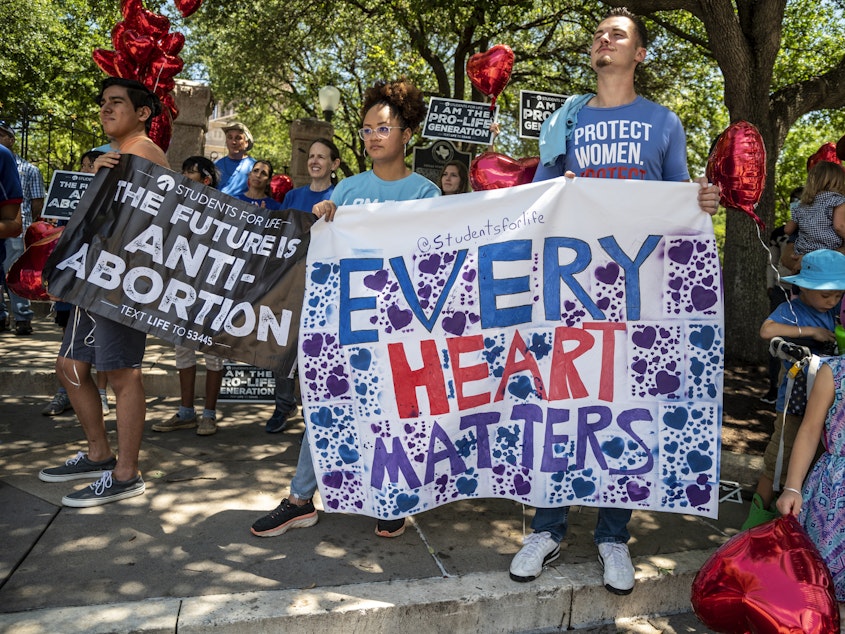More Abortion Restrictions Have Been Enacted In The U.S. This Year Than In Any Other

More abortion restrictions have been enacted across the U.S. this year than in any previous year, according to an analysis by a group that supports abortion rights.
State legislatures have passed at least 90 laws restricting the procedure in 2021 so far, finds a report released this month from the Guttmacher Institute.
"We're really trying to bring attention to the fact that state legislatures are moving very quickly on abortion bans and restrictions," Elizabeth Nash, a co-author of the report and principal policy associate at the institute, told NPR. "Abortion rights are at stake."
She said that a conservative shift in some state legislatures, emboldened by the 6-3 majority conservatives now hold on the U.S. Supreme Court — reshaped under former President Donald Trump — are driving the extraordinary wave of anti-abortion policies. The previous record was set in 2011 when states passed 89 abortion restrictions over the course of the entire year.
It's a milestone that anti-abortion-rights activists who have pushed for such laws count as a success.
Sponsored
Abortion restrictions reached the record number after Texas Gov. Greg Abbott signed a new measure into law in May that would ban abortions in the state as early as six weeks — often before many women may even realize they're pregnant. The bill also bans pregnancies that are the result of rape or incest but includes an exception for medical emergencies.
Similar "heartbeat bills," that seek to outlaw abortion the moment a fetal heartbeat has been detected, have been introduced in a handful of states.
But, as NPR previously reported, Texas adds a unique twist to its ban. Under the law, individuals would be allowed to sue anyone they believe may have helped a pregnant person violate the ban. Reproductive rights proponents fear that the abortion providers and abortion-rights activists will become the target in these cases.
Nash said the civil penalty, which makes it harder to challenge the law, was clever thinking on the part of Texas lawmakers.
"They're putting the responsibility on people across the country to enforce this ban," she said.
Sponsored
The Supreme Court prepares to take up abortion rights
The push to weaken abortion rights comes as the Supreme Court prepares to hear a case that will put a long-standing legal precedent upholding abortion rights to the test.
In the case, set to be taken up next term, Mississippi's last abortion clinic is challenging the constitutionality of a state law that bans most abortions after 15 weeks.
Since 1973, the court's landmark ruling in Roe v. Wade has given women the constitutional right to end a pregnancy before "fetal viability" — when the fetus is unable to survive outside the womb — or until about 24 weeks.
If the court upholds Mississippi's law, it would open the door for new state abortion restrictions that have long been considered unconstitutional under Roe.
Sponsored
"It's deeply concerning to see the Supreme Court take this case," Nash said. "Even by taking the case, the court is signaling that they could undermine abortion rights."
Abortion-rights opponents are looking to the high court
Joe Pojman, executive director of the anti-abortion group Texas Alliance for Life, said the Supreme Court's apparent readiness to take a new look at abortion rights gives opponents such as himself some hope that Texas and other states will see an outcome that gives them the latitude for such restrictions.
Although he expects the so-called Texas Heartbeat Act to face a series of court challenges, he wants to see such bills go even further, he said, "even up to the moment of conception — fertilization."
"We think the state has a right and a responsibility to protect all citizens, including the most vulnerable citizens — unborn children — from harm, and we believe that the state has a responsibility to protect those children from abortion," he said.
Sponsored
In 2018, the Centers for Disease Control and Prevention reported that there were 11.3 abortions per 1,000 women, a slight increase from the previous year. Restrictions on reproductive rights disproportionately affect women of color and low-income women.
"We know that people need access to this care, whether they live in Louisiana or New York," Nash said. "And we know that people are the best arbiters of their own lives and what they need. Ensuring that abortion is available and affordable is critical."
NPR's Sarah McCammon contributed to this report. [Copyright 2021 NPR]


